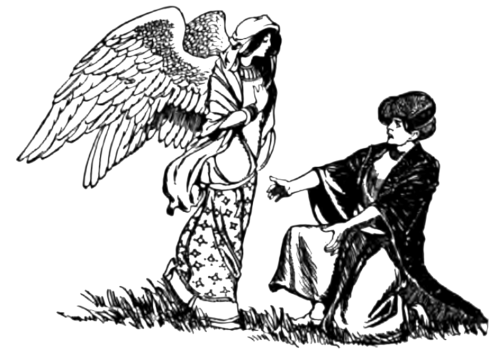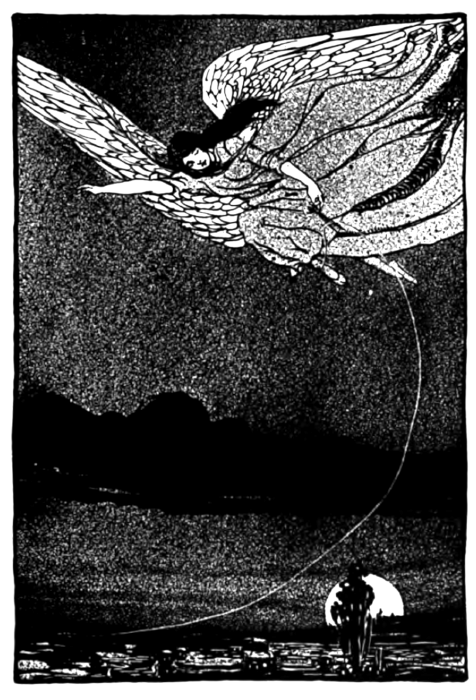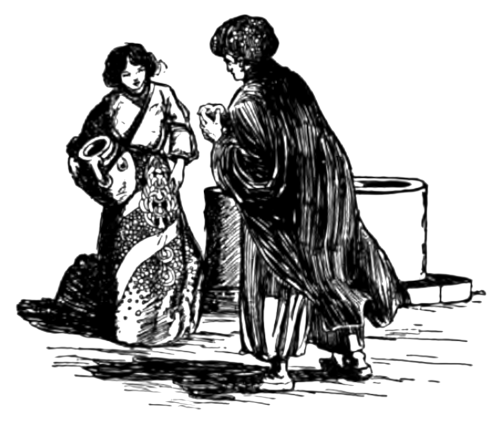| Web
and Book design,
Copyright, Kellscraft Studio 1999-2024
(Return
to Web
Text-ures)
| Click
Here to return to The Elm Tree Fairy Book Content Page Return to the Previous Chapter |
 (HOME)
|
|
SIR
RONAN AND THE PRINCESS
ONCE upon a time a young gentleman, whose name was Sir
Ronan, was walking in the forest and came to the side of a lake. There on the
shore he saw seven maidens at play. They had wings and they were very
beautiful, but one was more beautiful than any of the others. At sight of this
charming lady Sir Ronan became deeply in love with her and desired that she
should be his wife. He approached nearer, but on seeing him the seven maidens
fled through the forest. "Wait, wait!" cried Sir Ronan, "I mean, you
no harm," and he started in pursuit. They could easily have escaped, but the most beautiful one
looked back, and she was so attracted by the young nobleman's appearance that
she permitted him to overtake her. Meanwhile the other six, half running and
half flying, went on and disappeared from view.  Sir Ronan kneeled at the feet of the lady and said, "My
heart was filled with love for you at first sight, and unless you consent to be
my wife I will die of sorrow." The maiden gave him her hand and said, "I love you,
too, and where you dwell, there will I dwell also. If, when I looked back, my
love had not been awakened I should soon have left you hopelessly behind. My
six sisters, helped by their magic wings, are now far on their way to Kilat,
the kingdom of our father." In great joy Sir Ronan and the beautiful maiden went from
the forest to Sir Ronan's home, and they married and were very happy in each
other's company. But Sir Ronan's mother was afraid this happiness would not
last. "My son," she said, "your wife has wings and can go away
whenever she chooses without any possibility of our following to bring her
back. Let me take her wings that she may not leave you sorrowing." When the young wife learned of what Sir Ronan's mother
wished, she readily consented to take off her wings and give them into the old
woman's keeping. Presently it happened that the king heard of the beauty of
the lady Sir Ronan had wedded, and he invited Sir Ronan and his wife to come to
the palace that he might see her. So beautiful did she appear to him that he
wanted her for his own wife. So he sent Sir Ronan into the army and ordered him
to lead the troops in an attack on the enemy. He hoped Sir Ronan would be
killed and then the king would be free to marry the nobleman's wife. The lady was very much distressed when her husband left for
the war. She doubted if she would ever see him again, and as the days passed,
and no word came, she begged her mother-in-law to give back her wings. "I
cannot stay here quietly without my husband any longer," she said. "A
flight through the air might comfort me." "I will give you the wings," said Sir . Ronan's
mother, "if you will consent that I tie a cord to your feet so that I can
keep fast hold of the other end and be sure that you do not escape." The young wife consented, but having put on her wings and
flown up in the air she cut the cord and could go wherever she pleased. Her
freedom made her think of the kingdom of Kilat, where lived her father and her
six sisters, and thither she flew. Sir Ronan returned from the war, unhurt and victorious, but
his wife was gone, and without her his home seemed very desolate. He would not
be comforted and determined to seek her. "Probably she thought I would
surely be killed," said he, "and she has returned to her father's
kingdom. So to Kilat I will go, though seven years, seven months and seven days
be required for the journey." Through forests and over mountains and across plains Sir
Ronan toiled patiently. One day, as he sat eating some food he had bought at
the last village through which he passed, a fly lit on his hat which lay on the
ground before him and said, "I fear I shall die unless I have food at
once. Let me, I pray, have a portion of your lunch. I know from your looks that
you are in trouble, and you may some day need my help. Give me something to
eat, and whenever you want my aid, think of me, and I will come to you." "Eat," said Sir Ronan. "You are quite welcome
to the little that 'will satisfy the hunger of such a mite as you are; "and
he threw the fly a piece of bread. After a time he rose to travel on. The fly had finished
eating and was wiping off its head and wings with its legs. "My friend,
where are you going?" it asked. "To a land far away where my love abides," replied
Sir Ronan. "The way I do not know, but my heart guides me." Then he travelled on until he came to the sea. He had no
means of going farther, and he stood looking longingly out over the water when
two eagles of monstrous size came and lit on a tree near him. "As soon as
we are rested," said one of the eagles, "we will fly off across the
sea to Kilat." On hearing these words Sir Ronan cautiously climbed the tree and crept under the wing of the larger eagle, and there he clung to the feathers of the bird's body while the eagles flew away over the sea. When they at last reached their journey's end and alighted on a tree, he climbed down to the ground and walked on till he drew near a large city.  The princess gains her freedom At a well outside the city gate he stopped to quench his
thirst, and while he was drinking, seven handsomely dressed female slaves came
to get water. Sir Ronan asked them to whom they belonged.  "And which is the servant of the most beautiful
daughter?" Sir Ronan inquired. "I am," one of them responded. Then Sir Ronan spoke to this servant privately and took from
his finger a ring he had received from his wife. This he dropped in the
servant's water jar. "Pour the water out in the presence of you!
mistress," he commanded, "so that she will see the ring when it falls
from the jar. I will wait here at the well." The slaves went into the city and the one who served the
most beautiful princess did as she was ordered. The princess, on seeing the
ring, knew at once that her husband must be near. "Who was at the well
when you drew this water?" she asked the slave. "A nobleman of a far country," the slave replied. In great haste and joy the princess ran to her father.
"Outside the city gate," said she, "by the sacred well, my
husband awaits me. Let me go to him," she pleaded. "I must first prove that he is your husband," the
king responded. "You and each of my other six daughters must make ready a
table in the banquet hall spread with the best fare that the palace affords.
Then you must all go to your apartments and the stranger shall be brought in.
If he can select your table from among the seven he is your husband, but if he
knows not your table, he shall die." The tables were prepared, and Sir Ronan was summoned and
ordered to pick out the table made ready by the princess whom he claimed as his
wife. Sorely perplexed, Sir Ronan said to himself, "Now I have need of my
friend the fly." He thought earnestly of the fly for a moment, and the fly
came. It buzzed in a circle about his head a single time, and then it went and
lit on the table that had been set by Sir Ronan's wife. Immediately the
nobleman strode to the table and sat down. "Right," said the king, "but we must try one
more test." He called his servants and commanded them to make ready
seven curtains and to have one of his daughters conceal herself behind each
curtain. "Furthermore," said he, "I want you to make a slight
slit in the middle of the curtains, and each princess must put her little
finger through a slit. Then let the stranger look at the fingers and tell us
which is that of his wife." No sooner were the curtains and the princesses ready than
the grateful fly rested on the curtain from behind which was thrust the finger
of Sir Ronan's wife. Unhesitatingly the nobleman walked to the curtain and
clasped the finger. "Enough!" cried the king, "the princess shall be yours," and so pleased was he with his son-in-law that he made him second in power in the kingdom of Kilat. |